Special Issue
South Asia
The Beat of 1.8 Billion People
Human Resources Development
Engineers
Japanese Companies Expanding in India!
Aiming for New Business Developments
Manufacturing is responsible for about 16% of India's Gross Domestic Product (GDP). In expectation of continued growth, a Japanese die manufacturer is training young engineers.
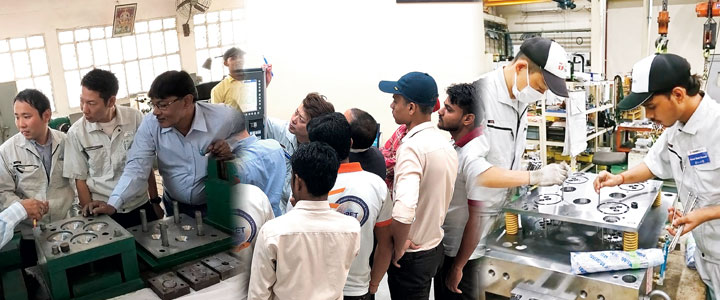
Transferring Japanese technology to students and teachers at a training school
India produces the fourth-highest number of vehicles in the world. The automobile parts industry, a vital industry for this production, accounts for between 2 to 3 percent of the country's GDP, and generates a lot of employment. GIFU TADASEIKI Co., Ltd., a Japanese die manufacturer, has been utilizing JICA's Public-Private Partnerships to train engineers for module dies (see Column) as it sees a lot of potential in this market, and wants to contribute to the growth of Indian industry. There are a lot of Western companies providing parts to car manufacturers operating in India. "We could sense the danger that Japanese companies would be left behind," said TADA Norio, the president of GIFU TADASEIKI. "We also felt it important to train young engineers in India and broaden the base of the vehicle parts industry there." Wanting to create a foundation for not just his company, but also other Japanese parts manufacturers, TADA visited India himself. He saw great potential, "By working with JICA, with its strong ties to the government, it presents the opportunity to expand our partners in India to also include the public sector."
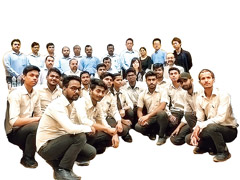
"Training the engineers of tomorrow"
Teachers and students from the Lucknow Campus.
The project's local partner was the Lucknow Campus of the Central Institute of Petrochemicals Engineering & Technology (CIPET), a research institute run by India's Ministry of Chemicals and Fertilizers. It is one of more than thirty vocational training schools around the country. This initiative started from preparing the curriculum, after which GIFU TADASEIKI engineers shared module die production techniques with eight local teachers. To ensure the knowledge was passed down correctly, the company's staff then assisted teachers as they taught their students. The students tackled the manufacture of module dies as their graduation projects, which were so well made that they attracted the attention of local parts manufacturers.
1. Training teachers
Teachers from the Lucknow Campus are fascinated by Japan's advanced die manufacture techniques.
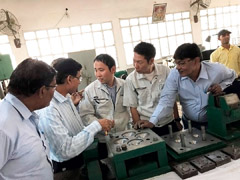
2. Teaching students
Students from the Lucknow Campus. They took about six months to fully master the basics of dies.
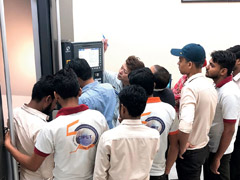
3. Learning in Japan as well
Lucknow Campus graduates who joined the Indo-Japan Tool Center established in India. They also studied in Japan working alongside regular employees.
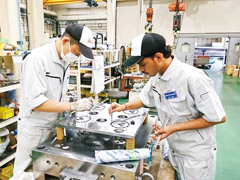
Graduates at a newly-established local subsidiary bolster "India-Japan Joint Manufactured" products
As the project proceeded, GIFU TADASEIKI decided to set up the Indo-Japan Tool Center to serve as a local subsidiary in conjunction with an Indian company. In addition to hiring five of the instructed students, other students were also given support for employment at Japan-based companies. As TADA said, "The aim was to expand good quality module die manufacture techniques in India. I hope that in the near future, our company and other Japanese parts manufacturers will benefit from the success of the graduates we fostered." The five new hires spent several months at a GIFU TADASEIKI plant in Japan to further hone their skills.
"I was impressed by the aspiration of Indian youth to learn. It's my pleasure to teach them, and it's a good stimulus for our own employees of the same age range, seeing how eagerly the Indians tackle anything and everything to master the techniques," TADA said, praising the Indian employees highly for the synergistic effect.
TADA explains the advantage of training engineers in modular molds, "It is possible to make joint products in India and Japan. We want to share technologies and reduce costs by dividing the production between the two countries." In the future, the company aims to primarily develop its business in mold components for automobile manufacturers, which are leading the manufacturing industry in India, while branching out to mold manufacturing for the consumer electronics field as the next step.
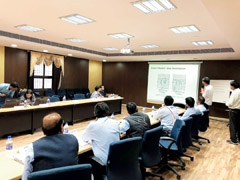
Visiting Lucknow Campus with an instructor from the Gifu University Center for Advanced and Smart Die Engineering Technology.
TADA Norio
President, GIFU TADASEIKI Co. Ltd.
Born in 1970. President of GIFU TADASEIKI. As a specialized manufacturer of plastic injection molds and die casting molds, the company designs and manufactures molds for automotive parts and faucet-related products. The company operates in Asia and Europe, and is expanding into a wide range markets around the globe.
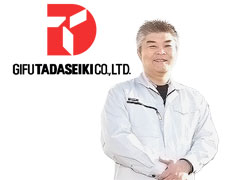
TADA Norio
Module dies created by graduates
These dies are mainly metal molds used to mold and process products and parts. For example, they are essential for making the switches and connectors used in automobiles. Generally, they are designed as a single mass of metal, but the module dies GIFU TADASEIKI taught them are designed to be able to separate into a base unit as the foundation, and a core unit that requires advanced techniques. By assembling these units, it is possible to mold complex, high-precision parts. In addition, if a die is damaged, only that part needs to be repaired or replaced.
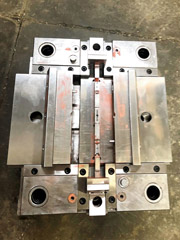




scroll